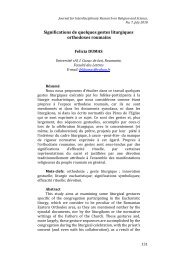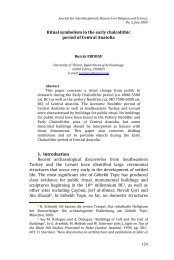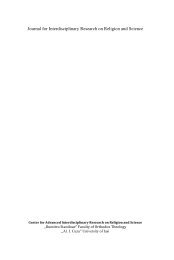Religious Dualism: Some Logical and Philosophical Difficulties
Religious Dualism: Some Logical and Philosophical Difficulties
Religious Dualism: Some Logical and Philosophical Difficulties
Create successful ePaper yourself
Turn your PDF publications into a flip-book with our unique Google optimized e-Paper software.
AFLOROAEI - <strong>Religious</strong> <strong>Dualism</strong>: <strong>Some</strong> <strong>Logical</strong> <strong>and</strong> <strong>Philosophical</strong> <strong>Difficulties</strong><br />
good» while the other one is «the evil». Consequently, the<br />
former will be responsible for a „good” creation, the latter for<br />
an „evil” one, <strong>and</strong> man, as an individual or as part of a<br />
community, will have to choose between them” 4 . He will focus<br />
on the older assumption that Iran could have been the native<br />
country of religious dualism 5 . However, he realises that this<br />
hypothesis is difficult to prove (taking into consideration the<br />
research conducted by specialists such as Carsten Colpe, H. M.<br />
Schenke <strong>and</strong> Gilles Quispel). There is also made an assumption<br />
that the dualist representations are in direct relation with the<br />
religious history of Judaism 6 . Dualist concepts <strong>and</strong><br />
representations were observed, on the one h<strong>and</strong>, in the ancient<br />
Greek or Mediterranean culture <strong>and</strong>, on the other h<strong>and</strong>, in the<br />
Indian culture 7 . A provisional conclusion is that dualist<br />
representations can be found in many cultures, none of them<br />
having directly influenced the others.<br />
In another work, The Dictionary of Religions, conceived by<br />
Mircea Eliade <strong>and</strong> completed by Ioan Petru Culianu in 1990, it<br />
is stated that the term „dualism” does not characterise only<br />
one Iranian religious doctrine or another. „Later on, scholars<br />
discovered that dualist myths are spread worldwide <strong>and</strong> suffer<br />
innumerable changes at all cultural levels <strong>and</strong> in a great number of<br />
religions, from those studied by ethnology to the „great religions” such<br />
as Buddhism, Christianity, Greek religion, Hinduism, Islam, Judaism<br />
etc.” 8 . A generally accepted definition of dualism is: ”an<br />
opposition of two principles”. It is mentioned that this formula<br />
„involves judgement based on moral values (good/evil) <strong>and</strong> a<br />
hierarchical organisation of reality at all levels: cosmological,<br />
anthropological, ethical etc”. We also find that „two types of religious<br />
dualism have been traditionally recognised: the radical dualism, which<br />
states the existence of two co-eternal principles, responsible for the<br />
whole creation; <strong>and</strong> the moderate or monarchical dualism (which does<br />
not question the monarchical authority of a supreme creator),<br />
supporting the idea that the second principle appears later <strong>and</strong> has its<br />
4 Ioan P. Couliano, Les gnoses dualistes d’Occident. Histoire et mythes,<br />
Plon, 1990, chap. I, 1.<br />
5 Ibidem, chap. I. 3.<br />
6 Ibidem.<br />
7 Ibidem, I.6.<br />
8 Mircea Eliade, Ioan Petru Couliano, Dictionnaire des religions, Plon,<br />
1990, § 12.1.<br />
86





